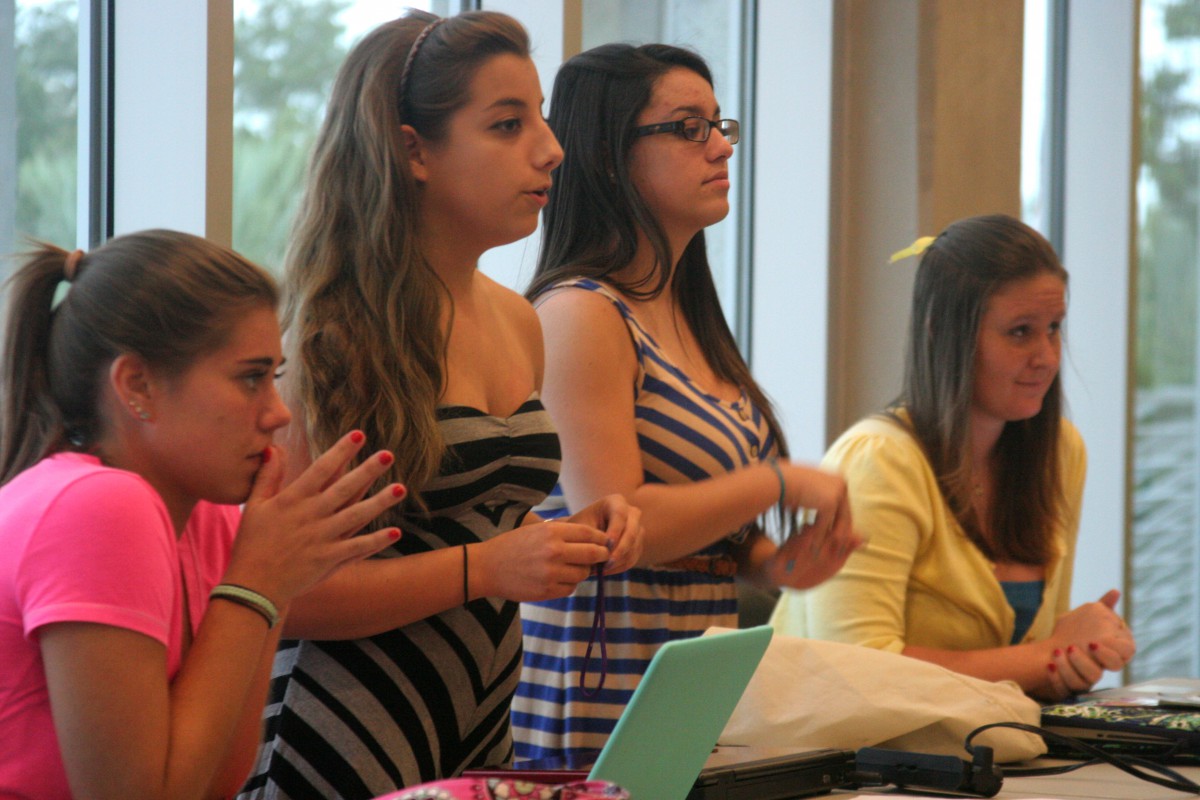For the last three months Amanda Dicicco has been living and breathing Delta Sigma Zeta. Along with her “wingwomen,” Olivia Mayer and Giana Stabile, Dicicco has started a group with hopes of becoming a sorority—the first step toward making Greek life at USF St. Petersburg a reality.
Right now DSZ is a “colony,” a regional group with intent to join on of the 26 nationally represented organizations. The process can take one to four years, and requires approval letters from the chancellor, college deans and student advisers. Representatives from the National Panhellenic Conference will eventually come to survey the colony, and determine whether or not the university is ready to house a sorority.
“We’re trying to start this off as positive as we can, with charity,” Dicicco said. “We’re not asking the school for money. We’re not trying to be a club. We’re not trying to do hazing and different crazy parties. We’re really just trying to better our community and our school, and have a place where our ladies can learn how to be leaders.”
DSZ is planning to volunteer at hospitals and nursing homes, and hopes to do campus events, such as trick or treating in the residence halls and beach cleanup.
The colony was just an “idea thrown out in the air,” Stabile said. The three founders worked on a project for Student Life over the summer, and one of their assignments was to survey students to find out what they wanted at USFSP. Camped out on a Sunday afternoon, they heard ideas ranging from jet skis, to toga parties, to campus maps on every corner. Greek life came up most frequently, and they decided to take a look into how to do it.
Delta Sigma Zeta held an information meeting in mid-September, with 20 students showing up and an additional 20 students expressing interest. Last week, DSZ accepted 54 women into the colony. The members had to apply, with the recruitment form asking brief questions on grade point average, community service and any felony charges.
And though the group plans to improve campus life and the community, many students oppose Greek life at USFSP—at least virtually. The central debate isn’t in the flesh, but in a Facebook group called “Bring GREEK LIFE to USF St. Petersburg.” Supporters say fraternities and sororities will increase enrollment, and create a “true” college experience as the campus moves away from a commuter school image. Critics say Greek life would divide the close-knit community, and expressed concern over binge drinking and organization dues to participate.
“No thanks,” posted student Nicole Cate. “Now that I’m a senior I see what great opportunities I’ve had at our beautiful, accepting school. USFSP is a unique niche in the realm of higher education where, literally, everyone is accepted.”
Christian Haas wrote he’s “uncomfortable” with Greek life, which may bring exclusivity to campus. “I think the more we identify with and take pride in arbitrary labels, the harder it will be for our generation to understand, embrace and appreciate diversity.”
For Dicicco, Mayer and Stabile, however, “sisterhood” promotes commitment, strength and service. “The definition of sorority is to better women, to make leaders out of women and show their true potential,” Dicicco said. “We can do a lot of great things in the world, we can start companies, we can start businesses and we want to show these girls that they can do something.” Mayer said crazy house parties are only in the movies (or fraternities), and sorority houses have strict rules about staying out late.
Mayer added she and many students were placed at St. Petersburg after being deferred from Tampa, and with Greek life, “next year’s freshmen won’t feel left out.” Dicicco agreed, saying USF Tampa “thinks were not the real USF,” and a Greek presence is the one way USFSP can “stand up to Tampa.”
Dicicco, Mayer and Stabile know the process is difficult, and despite the initial enthusiasm, their effort might not be successful in the long term.
“It can’t be impossible,” said Dicicco, adding they have four years to keep trying. “And, are we really failing if every year we raise another dollar, helping another charity or making a kid smile?”



